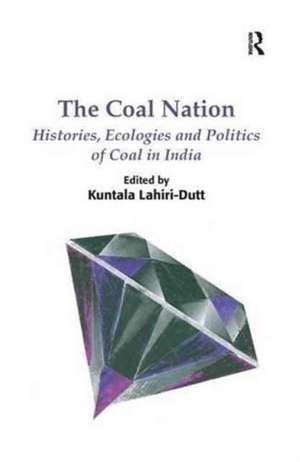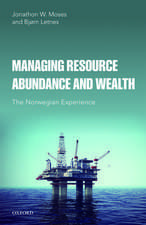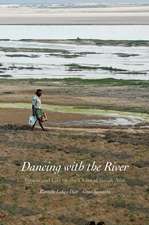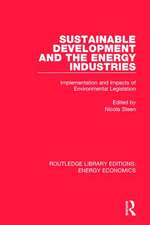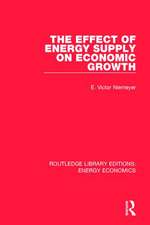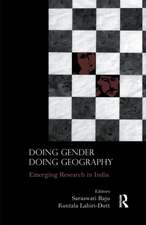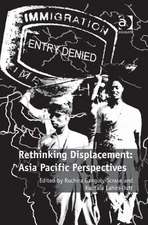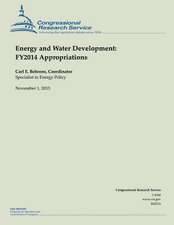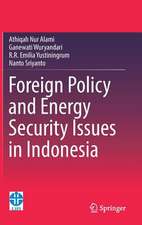The Coal Nation: Histories, Ecologies and Politics of Coal in India
Autor Kuntala Lahiri-Dutten Limba Engleză Paperback – 17 noi 2016
| Toate formatele și edițiile | Preț | Express |
|---|---|---|
| Paperback (1) | 469.34 lei 6-8 săpt. | |
| Taylor & Francis – 17 noi 2016 | 469.34 lei 6-8 săpt. | |
| Hardback (1) | 1062.16 lei 6-8 săpt. | |
| Taylor & Francis – 11 apr 2014 | 1062.16 lei 6-8 săpt. |
Preț: 469.34 lei
Nou
Puncte Express: 704
Preț estimativ în valută:
89.82€ • 93.43$ • 74.15£
89.82€ • 93.43$ • 74.15£
Carte tipărită la comandă
Livrare economică 14-28 aprilie
Preluare comenzi: 021 569.72.76
Specificații
ISBN-13: 9781138272033
ISBN-10: 1138272035
Pagini: 348
Dimensiuni: 156 x 234 x 19 mm
Greutate: 0.45 kg
Ediția:1
Editura: Taylor & Francis
Colecția Routledge
Locul publicării:Oxford, United Kingdom
ISBN-10: 1138272035
Pagini: 348
Dimensiuni: 156 x 234 x 19 mm
Greutate: 0.45 kg
Ediția:1
Editura: Taylor & Francis
Colecția Routledge
Locul publicării:Oxford, United Kingdom
Notă biografică
Kuntala Lahiri-Dutt is a Senior Fellow at the Resource, Environment and Development group at the Crawford School of Public Policy, ANU College of Asia and the Pacific, The Australian National University. Dr Lahiri-Dutt has written widely on mining and related issues; these were published in Gender, Place and Culture, South Asia, South Asian History and Culture, Natural Resources Forum, Development, Economic and Political Weekly among others.
Recenzii
’Combining the insights of social history, political economy and political ecology, The Coal Nation is able to expose not only the contested and often violent history of India’s exploitation of coal, but also charts the larger contours of India’s colonial and post-colonial development. A vibrant and wide-ranging collection of pathbreaking contributions to our understanding of how coal came, and continues, to energize India.’ Michael Watts, University of California, Berkeley, USA ’Civilisation as we know it is grounded in the dirty labour practices of dirty fossil carbon. But this fact is as unfamiliar to most students of civilisation as it is to students of development and economy. In this important multidisciplinary book, Lahiri-Dutt’s team has prospected Indian coal to expose rich seams. A significant achievement requiring global attention.’ Barbara Harriss-White, Emeritus Professor, Oxford University, UK ’The great strength of this book is its breadth. Drawing on history, geography, economics, engineering and policy studies it demonstrates the value of interdisciplinary co-operation. This approach provides a unique understanding of an industry that played a critical role in Indian history and will grow in importance with the doubling of production that is predicted for the next decade. Alive to the industry's potential for expanding socio-economic development, the book explores problems of safety, dispossession, ownership, ecological degradation and climate change. The chapters provide specialist knowledge of different periods, places and problems, yet converse with each other to offer an integrated picture of the industry as a whole. In so-doing it poses pertinent questions for policy makers and for public discussion.’ Peter Alexander, University of Johannesburg, South Africa
Cuprins
Chapter 1 Introduction to Coal in India: Energising the Nation, Kuntala Lahiri-Dutt; Part II Justice, Legality and History; Chapter 2 Between Informal Legitimacy and Illegality: Coal Mining at the Limits of Justice 1 A version of this Chapter first appeared in Economic and Political Weekly, on 8 December 2007. I thank the Editor of EPW for his permission to use this revised version., Kuntala Lahiri-Dutt; Chapter 3 Coal in Colonial Assam: Exploration, Trade and Environmental Consequences, Arupjyoti Saikia; Chapter 4 Border Mining: State Politics, Migrant Labour and Land Relations along the India-Bangladesh Borderlands, Debojyoti Das; Chapter 5 Slaughter Mining and the ‘Yielding Collier’: The Politics of Safety in the Jharia Coalfields 1895–1950, Dhiraj Kumar Nite; Chapter 6 Stranded Between the State and the Market: ‘Uneconomic’ Mine Closure in the Raniganj Coal Belt 1 An earlier version of this paper was published in Economic and Political Weekly. I thank the Editor of EPW for his permission to publish the revised version., Kuntala Lahiri-Dutt; Part IIa Mining Displacement and Other Social Impacts; Chapter 7 World Bank, Coal and Indigenous Peoples Lessons from Parej East, Jharkhand, Tony Herbert, Kuntala Lahiri-Dutt; Chapter 8 ‘Captive’ Coal Mining in Jharkhand: Taking Land from Indigenous Communities, Kuntala Lahiri-Dutt, Radhika Krishnan, Nesar Ahmad; Chapter 9 Coal Mining in Northeastern India in the Age of Globalisation 1 A different version of the article was published online on the India Environment Portal, http://indiaenvironmentportal.org.in/files/Dr%20walter%20fernandes.doc, Accessed 21 May 2013., Walter Fernandes, Gita Bharali; Chapter 10 Marginalising People on Marginal Commons: The Political Ecology of Coal in Andhra Pradesh, Patrik Oskarsson; Chapter 11 Water Worries in a Coal Mining Community: Understanding the Problem from the Community Perspective, Prajna Paramita Mishra; Chapter 12 Gender in Coal Mining Induced Displacement and Rehabilitation in Jharkhand, Nesar Ahmad, Kuntala Lahiri-Dutt; Part III Social Perspectives to Inform Mining Policy; Chapter 13 Colonial Legislation in Postcolonial Times, Nesar Ahmad; Chapter 14 On the States’ Ownership and Taxation Rights over Minerals in India, Amarendra Das; Chapter 15 Key Policy Issues for the Indian Coal-Mining Industry 1 We acknowledge financial support for some of this work through the Harvard Kennedy School’s project on Energy Technology Innovation Policy, from the David & Lucile Packard Foundation; a gift from Shell Exploration and Production; and general support grants from BP Alternative Energy and Carbon Mitigation Initiative. AC notes that the views expressed in this Chaptere his alone and that they do not reflect the views of ICF International., Ananth Chikkatur, Ambuj Sagar;
Descriere
The Coal Nation explores the complex history of coal in India; from its colonial legacies to contemporary cultural and social impacts of mining; land ownership and moral resource rights; protective legislation for coal as well as for the indigenous and local communities; the question of legality, illegitimacy and illicit mining and of social justice. Presenting cutting-edge multidisciplinary social science research on coal and mining in India, The Coal Nation initiates a productive dialogue amongst academics and between them and activists.
